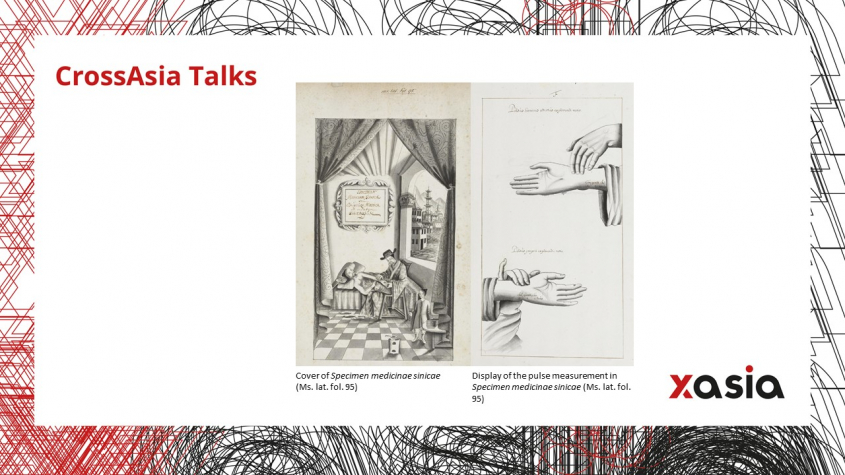CrossAsia Talks: Gianna Pomata/Marta Hanson am 7.11.2024
(See English below)
Wir möchten Ihnen den CrossAsia Talk mit dem Titel: “A Sample of Chinese Medicine for 17th-Century Europe” von Gianna Pomata und Marta Hanson ankündigen. Er wird am 7. November 2024 ab 18 Uhr (UTC+1) online stattfinden. Sie werden darstellen, wie Ideen der traditionellen chinesischen Medizin im 17. Jahrhundert ihren Weg nach Europa gefunden haben und wie der Wissenstransfer zu jener Zeit funktionierte.
Our lecture will focus on a book that played a key role in the introduction of Chinese medicine to Europe: Specimen Medicinae Sinicae sive Opuscula Medica ad Mentem Sinensium (A Sample of Chinese Medicine, or Brief Medical Works According to the Mind of the Chinese: Frankfurt am Main, 1682). The only extant manuscript of this book and some preparatory materials are held at the Staatsbibliothek in Berlin. Specimen included various writings, some presented as translation from the Chinese into Latin. Equipped with illustrations drawn from Chinese sources, the book dealt with basic Chinese physiological, anatomical, and therapeutic notions, mostly related to pulse medicine. No European authors or translators were acknowledged, except for the editor Andreas Cleyer, a German medical practitioner in the service of the Dutch East India Company in Batavia (present-day Jakarta).
In our lecture, we will describe our collaborative research on this text. Many questions were still unanswered when we started our project. Who wrote Specimen? Who translated the Chinese texts included in it? Centuries of controversies had obscured Specimen’s authorship. Recent research, including our own, has indicated with reasonable certainty that the Jesuit China missionaries Michael Boym and Philippe Couplet translated or otherwise wrote most of the texts assembled in Specimen. We have also identified some of the Chinese writings chosen for translation and we have compared these Chinese originals with their Latin rendering. Finally, we have traced Specimen’s journey from China, where the book was written, to Dutch Batavia, where the manuscript was lost and found, to Frankfurt, where it was finally published. The appearance of the book in Europe required the transnational collaboration of three sets of people across the globe: some Jesuits in the China mission, such as Boym and Couplet, who authored the translations; a medical practitioner of the Dutch East India Company in Batavia, Andreas Cleyer, who collected fragments of their work; and on the receiving end of the network, an association of learned physicians, the German Academia naturae curiosorum, who sponsored the publication.
Die Vortragssprache ist Englisch. Bei Fragen kontaktieren Sie uns gern über folgende Mailadresse: ostasienabt@sbb.spk-berlin.de. Die Veranstaltung wird aufgezeichnet.*
Der Vortrag wird via Webex gestreamt und aufgezeichnet. Sie können am Vortrag über Ihren Browser ohne Installation einer Software teilnehmen. Klicken Sie dazu unten auf „Zum Vortrag“, folgen dem Link „Über Browser teilnehmen“ und geben Ihren Namen ein.
Alle bislang angekündigten Vorträge finden Sie hier. Die weiteren Termine kündigen wir in unserem Blog und auf unserem X-Account an.
—
We would like to announce the CrossAsia Talk entitled: “A Sample of Chinese Medicine for 17th-Century Europe” by Gianna Pomata and Marta Hanson. It will take place online on November 7, 2024 from 6 pm (UTC+1). They will discuss how ideas of traditional Chinese medicine first came to Europe in the 17th century and how the transfer of knowledge worked at that time.
Our lecture will focus on a book that played a key role in the introduction of Chinese medicine to Europe: Specimen Medicinae Sinicae sive Opuscula Medica ad Mentem Sinensium (A Sample of Chinese Medicine, or Brief Medical Works According to the Mind of the Chinese: Frankfurt am Main, 1682). The only extant manuscript of this book and some preparatory materials are held at the Staatsbibliothek in Berlin. Specimen included various writings, some presented as translation from the Chinese into Latin. Equipped with illustrations drawn from Chinese sources, the book dealt with basic Chinese physiological, anatomical, and therapeutic notions, mostly related to pulse medicine. No European authors or translators were acknowledged, except for the editor Andreas Cleyer, a German medical practitioner in the service of the Dutch East India Company in Batavia (present-day Jakarta).
In our lecture, we will describe our collaborative research on this text. Many questions were still unanswered when we started our project. Who wrote Specimen? Who translated the Chinese texts included in it? Centuries of controversies had obscured Specimen’s authorship. Recent research, including our own, has indicated with reasonable certainty that the Jesuit China missionaries Michael Boym and Philippe Couplet translated or otherwise wrote most of the texts assembled in Specimen. We have also identified some of the Chinese writings chosen for translation and we have compared these Chinese originals with their Latin rendering. Finally, we have traced Specimen’s journey from China, where the book was written, to Dutch Batavia, where the manuscript was lost and found, to Frankfurt, where it was finally published. The appearance of the book in Europe required the transnational collaboration of three sets of people across the globe: some Jesuits in the China mission, such as Boym and Couplet, who authored the translations; a medical practitioner of the Dutch East India Company in Batavia, Andreas Cleyer, who collected fragments of their work; and on the receiving end of the network, an association of learned physicians, the German Academia naturae curiosorum, who sponsored the publication.
The lecture will be held in English. If you have any questions, please contact us at the following e-mail address: ostasienabt@sbb.spk-berlin.de. The event will be filmed.*
The lecture will be streamed via Webex. You can take part in the lecture using your browser without having to install a special software. Please click on the respective button “To the lecture” below, follow the link “join via browser” (“über Browser teilnehmen”), and enter your name.
You can find all previously announced lectures here. We will announce further dates in our blog and on X.



 Cloud&Heat
Cloud&Heat
Diskutieren Sie hierzu im CrossAsia Forum